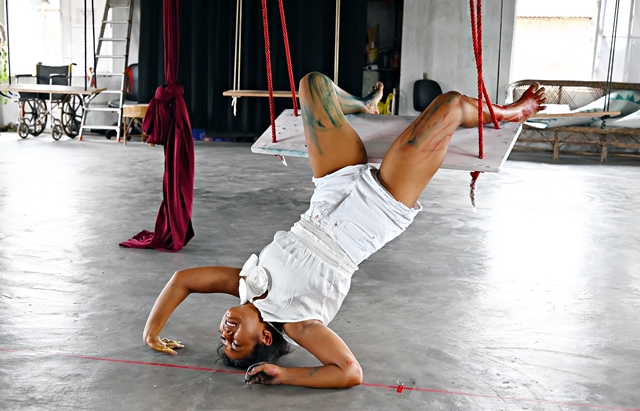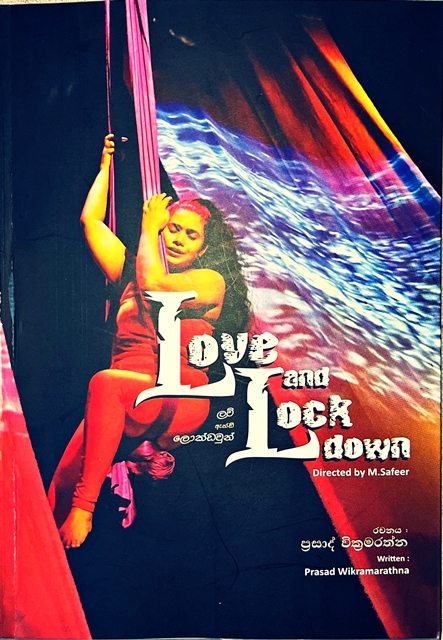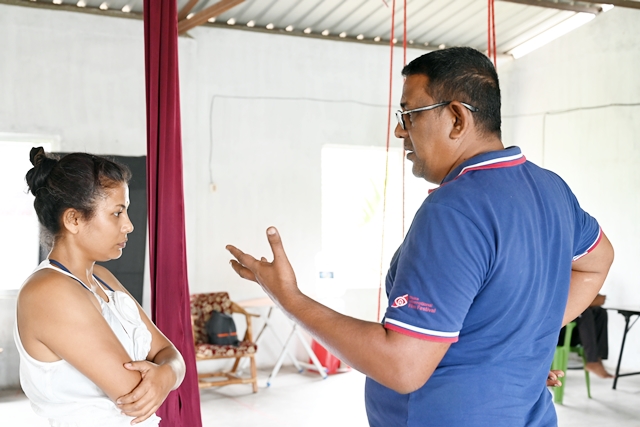‘Manjula and I have a dream of performing the play in ten languages’ – Md Safeer.

Guwahati is about to experience an International Drama Production, likely the first of its kind, a play that brings together theatrical talent from several countries worldwide. Gathering such talent in one place for a purpose is incredibly challenging in terms of communication, time, money, and the arduous labour required. The point is that such plays impact the intellectual and cultural environment of the time, stirring the minds of creative individuals. This impact may initially be small, but it delves deep, illuminating the realm of creation with new possibilities. Creative individuals from different countries come together for work and reach a consensus after discussions—this creative process is challenging. However, these challenges give rise to new possibilities and experiences. It’s not just the creators who experience this but also the audience. Many such experiments are underway worldwide, but this will be the first artistic experiment of its kind in Guwahati, which is exciting news for the cultural community.

This production is organized by a theatre group titled AANK, led by Dr Mrinal Jyoti Goswami, an academic who works in a state university and is passionate about theatre. He initiated an international theatre festival last year. At this festival, a theatre troupe from Sri Lanka staged two plays that captivated the audience. Safeer directed one of those plays, ‘Love and Lockdown,’ and will also direct this new play, while the allure of his previous work still lingers. Naturally, the audience is excited about the upcoming play.
Safeer combines various elements in drama production, transforming the play into a unique experience. He has been invited from various countries worldwide to showcase the achievements of his art. He is also an established book publisher and has made his debut as a film director. The film has already been screened at several film festivals.
Witnessing the first performance of a play, movie, exhibition, etc., is a satisfying and often rare experience. We will witness the first performance of Safeer’s latest production here in Guwahati. I had the opportunity to witness a rehearsal of the production and engage in a brief discussion about it.
‘The author of the play, Manjula Wedivardhana, originally from Sri Lanka but now living in France, is a renowned novelist and poet. I had a concept like this: there will be five scenes—five different colours, representing five men—and there will be one woman. She will be the last woman on earth, acting in front of the five men, her final act. He wrote a play based on this concept, a poetic play written in Sinhalese. The play was translated into English by the Australian author Dilini Areawala. In 2016, I met an Italian actress named Julia Filippo at the Colombo National Theater Festival. She was seeking an opportunity to work with an Asian director, having already worked with many European directors and wanting to gain new experiences and knowledge. We began working on the play, which premiered in Dubai at the Foreza Monodrama Festival. The festival is attended by thousands of theatre professionals from different countries worldwide. The play was well-received by audiences worldwide. The main feedback was that monodrama is usually centered around the actor, but this play incorporates a combination of set design, lighting, dance, music, and acting. The play received invitations from many countries, and we performed it in several, including Korea and Azerbaijan. I also staged the play in Pune, India, and in Sri Lanka. My friends expressed the need for a Sinhalese version of the play, so I staged it in Sinhalese with a Sinhalese actress. Then came COVID, and the play was put on hold. Last year, I spoke to Mrinaljyoti Goswami, and finally, we are here. Mrinal translated the play into Assamese, and we will perform it with an Assamese actress,’ Safeer said.

“How will the play continue after this, and what are your plans?”
‘Manjula and I have a dream – we will perform the play in ten languages. It has been performed in English and Sinhalese, and it’s currently being performed in Assamese. Next year, it will be performed in French. The initial plans to perform the play in Hindi and Korean have been completed.’
“A play, not just a play, any artwork, has its roots in the soil of its place. How can the context of those roots be preserved during such phases of transformation?’ ‘It’s quite simple. In this Assamese play, we have incorporated elements that evoke the essence of Assam. As a director, I don’t rely solely on the text of the play. I take the dialogue, and the rest is my own interpretation. Manjula wrote many things, and I have selected only certain parts. We have created several versions of the play, which means we have interpreted it in various ways. Each production is an interpretation.’
“You are an advocate and practitioner of physical theatre. How do you view physical theatre?’ ‘Many people consider gestures alone as the essence of physical theatre. However, I believe and practice differently—physical theatre is not just about gestures. It encompasses dance, music, lights, sets—all components contribute to physical theatre.’
The play is translated by Dr. Mrinal jyoti Goswami and will be staged on April 28 and 29 at the Madhavdev Auditorium of Srimanta Sankardev Kalakshetra. ‘Premar Dolna (Swings of Love)’ introduces Jahnabi Borah, a promising talent and National School of Drama, Sikkim Centre alumnus, to Guwahati’s theatre aficionados. Under the guidance of director M Safeer, Jayadewa Upeksha Sandeepani, and H.M. Pasindu Nirmal Perera from Sri Lanka contributed as associates, with Dhrubajyoti Deka from Assam serving as the production manager.